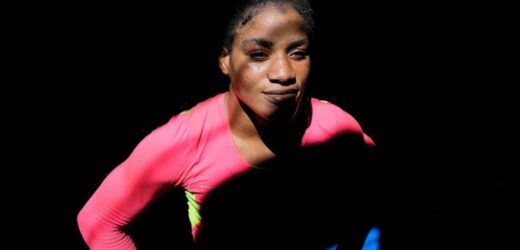CONAKRY, Guinea — Fatoumata Yarie Camara is used to being thrown to the ground and getting up again, getting back into the fight. She’s dedicated her life to wrestling, a sport that breeds tenacity. On the mat, she qualified for the Tokyo Olympics, the only athlete from Guinea to do so. Off the mat, she has battled the beliefs of her culture and family that women don’t belong in sports.
Camara endured delays as the pandemic threatened the Games. Then, three days before the rescheduled opening ceremony, her dream of standing alongside the world’s best athletes teetered on a plane ticket — one she couldn’t afford and government officials hadn’t given her. Saying they wanted to keep Guinea’s athletes safe from COVID-19, the country withdrew from the Olympics entirely.
Camara and others were skeptical of officials’ reasoning and believe Guinea mismanaged planning for the Games. She gives the nation hope, officials tell her, but they’ve never given her any.
At home, the 25-year-old clutched her medals — from regional competitions, the African Games, and her Olympic qualifying event — and cried.
It was the one time Camara felt she couldn’t get back up and fight.
———
This story is part of a yearlong series on how the pandemic is impacting women in Africa, most acutely in the least developed countries. AP’s series is funded by the European Journalism Centre’s European Development Journalism Grants program, which is supported by the Bill & Melinda Gates Foundation. AP is responsible for all content.
———
In Hamdallaye, one of the most populous and poorest neighborhoods of the capital city, Conakry, few dare to dream of leaving. Camara’s family lives shoulder-to-shoulder with neighbors. Streets are strewn with garbage. Children play in mud.
Camara sleeps on a mattress on the floor. Her medals hang from a nail on the wall, a reminder of her Olympic dream.
At 14, Camara was playing soccer when she caught the eye of a soldier who wrestled. “You have talent,” he told her, and asked if she’d considered wrestling. She’d never heard of it. He described the sport, and visited her family to earn their support.
At her first competition, Camara won a gold medal. “I started to love wrestling,” she said.
Camara’s mother, Kadiatou Soumah, supported her, despite community and family objections. Sports aren’t meant for girls, they said. Soumah backed her daughter with what little funds she had. Soumah’s husband stopped working when Camara was 3. Soumah supported him and Camara’s siblings, too.
It’s rare for a West African woman to be the family’s sole breadwinner. Employment isn’t easy for Guinea’s 13 million residents. Many live in poverty despite Guinea’s rich reserve of bauxite, the base material for aluminum, and mines for gold and diamonds. The health care system is still recovering from the 2014-2016 Ebola outbreak.
Soumah saw wrestling as a lifeline for the family. Camara won more medals. She gave up school.
Soumah sold candy and eggs on the roadside and went door-to-door seeking housework. She was her daughter’s manager and cheerleader.
But Camara’s victories never netted earnings. Soumah’s support waned: “It only comes with medals. Never with money.”
As she grew older, Camara was expected to help support the family. But she continued competing and was often away.
She moved to Morocco to train via a grant from international governing body United World Wrestling. When the pandemic hit, Camara and others were locked down. They weren’t allowed to wrestle for 10 months, the body-on-body contact deemed high-risk.
Camara used a wrestling term to describe it: “COVID blocked us.”
She went home, to a country without proper wrestling facilities. Coach Vincent Aka moved Camara and three others to his native Ivory Coast.
Then, in April’s African and Oceania qualifying tournament in Tunisia, Camara took silver — officially qualifying for the Olympics. She was on top of the world.
She went to a training camp in Italy to prepare. And, before the Olympics, she returned to Guinea; she was big news as the Games neared. Still, she felt unsupported by Guinean leaders, despite their praise of her.
“Fatoumata Yarie Camara carries the hope of the entire Guinean nation. She is the hope of a whole people,” said Ben Daouda Nansoko, secretary general of Guinea’s Olympic committee.
Yet, days before the Games, the trip’s budget wasn’t approved. She still had no plane ticket.
Soumah grew tired of empty promises and no longer believed Camara should go to the Olympics. After officials visited their home to change Soumah’s mind, she relented. But she remained skeptical of their vows of money.
Camara once believed she’d carry Guinea’s flag at Tokyo’s opening ceremony. Guinea has four additional athletes listed to compete who didn’t qualify but instead were given places through a program that helps underrepresented nations.
Camara is world-ranked and thought she’d certainly be the flag-bearer. But Guinean officials told her she’d fly to Tokyo the week after the ceremony, the flag carried instead by a Japanese volunteer.
Camara told herself it was OK — she’d still get to compete.
Or would she? Confusion reigned for several days, with the government announcing it would withdraw the entire team due to “the resurgence of COVID-19 variants.” But reports theorized that the country simply hadn’t set aside funds for the delegation.
Camara grieved for her Games, but ultimately accepted that she wouldn’t make the trip.
“The Olympics have always been a dream,” she said. “But this is God who controls all. I must just keep the courage”
Guinea’s withdrawal caused an uproar — nationally and beyond. The government reversed its decision a day after its announcement and said athletes would indeed compete. Officials said they’d received guarantees from health authorities that eased their worries.
Camara and others remained skeptical that COVID-19 was ever the issue. But it didn’t matter — once again, she was headed to the Olympics.
Coach Aka and United World Wrestling were ready to pay for Camara’s flight, in case Guinean officials didn’t follow through. But in the end, they did. On the day of the opening ceremony, Camara boarded an airplane. Gripping her seat, she smiled for a photograph.
It was too late to carry the flag. And maybe her mother disapproved.
But the flight was confirmed. She had a 48-hour trip ahead. And on Wednesday, Camara will compete in the Olympic Games.
She and Aka took photos of her ticket.
It has her name: Fatoumata Camara. Destination: Tokyo.
———
Imray reported from Tokyo. Thomas reported from Rome. Carley Petesch contributed from Dakar, Senegal.
Source: Read Full Article

